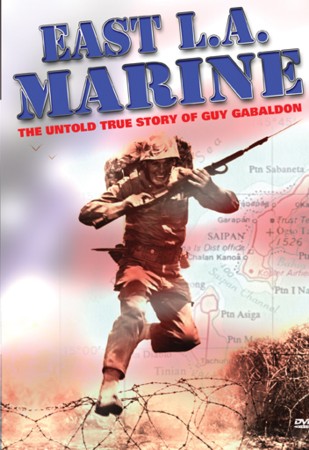|
Reviews of Recent Independent, Foreign, & Documentary Films in Theaters and DVD/Home Video
Written, Produced & Directed by Steven Jay Rubin Produced by Gumapas & Shawn Tabor Edited by Louis Gumapas Music by Luis Ascanio Released by Arts Alliance America USA. 77 min. Not Rated Special Features: Over 20 minutes of interviews with Gabaldon Narrated by Freddie Prinze Jr. In an era when the means of production are so accessible, it only follows that increasing numbers of low-budget films, especially short films and documentaries, are popping up everywhere. East L.A. Marine, a documentary with low production values, undermines its subject, Guy Gabaldon, a U.S. Marine in the Pacific Theater during World War II – he single-handedly captured one thousand prisoners. There is even a feature film about his exploits, Hell to Eternity (1960). The source material here is outstanding. The director couldn’t find a better story. What is problematic is that the filmmakers appear to believe that the story would tell itself. It doesn’t. There is a lack of focus that seems common among low-budget festival fare. At times, the film profiles Gabaldon’s life, his youth in Los Angeles, how he learned Japanese, and his life as a Marine. At other times, it seems more focused on the intricacies of the battles in Saipan, where Gabaldon famously talked hundreds of Japanese soldiers out of the caves and into U.S. POW camps, including 800 in one day. Yet the beginning of the film tries to convince the audience that it will present the facts surrounding the controversial lack of recognition for Gabaldon’s achievements, namely that he was never awarded the Congressional Medal of Honor and was only awarded the Marine’s highest honor, the Navy Cross, after the release of Hell to Eternity. The introduction draws the viewer in by telling them that they will have to decide why he was denied the medal – if it because he was Hispanic, outspoken about his problems with commanding officers, or that the war was nearly over. But after the beginning, the matter never resurfaces. This film is so confused that it becomes hard to watch, even when it clocks in at just over 75 minutes. It has so much to say and no defined way of saying it.
This is not to say that this documentary is without merit. At the heart of its narrative seems to be the notion that in a time of unpopular wars, it
is important to remember the individuals who have made American independence possible and have sacrificed for their country without any request for
compensation. While the film never finds the avenue to pull itself into a coherent narrative, it is still an important account worth hearing.
Dustin L. Nelson
|


